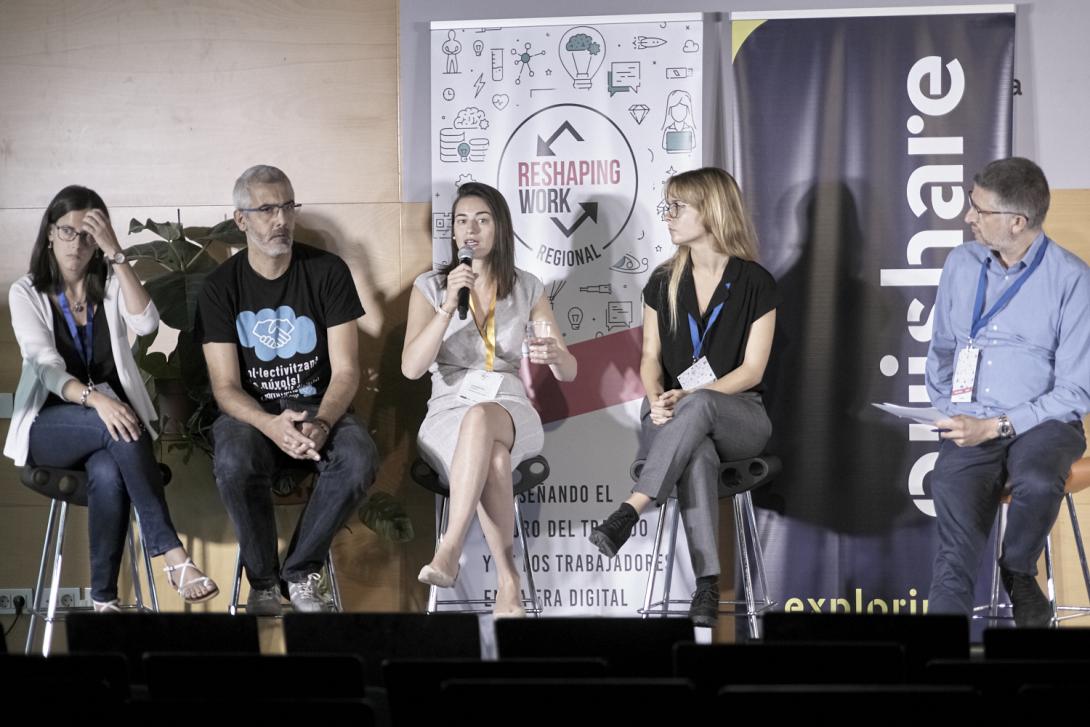
My takeaways from Reshaping Work Barcelona 2019
cross-posted from the P2P Foundation
I was one of the Ouishare members that volunteered for the organization of the first regional Reshaping Work event in Barcelona. In my view, it was an outstanding event because of its excellent content selection and format design, and it certainly had a remarkable impact in the Spanish media. I would like to focus, nevertheless, on one of the parallel sessions I attended, devoted to the presentation of the most recent research results on the matter. It was not by chance that all the presentations were excellent: a scientific committee chose them after a Call for Papers. My interest in them is that I think that they illuminate some of the key questions around the future and the possibilities of cooperative platforms.
How platform cooperatives deal with the size-identity tradeoff?
The first presenter was Jovana Karanovic. She is the founder of Reshaping Work, and a researcher at the KIN Center for Digital Innovation at VU Amsterdam. Following Carmelo Cenammo, the starting point of her talk was a trade-off that platforms face: the one of the platform size that leverages growth of network effects (the winner-takes-all logic of Uber, Airbnb, and Deliveroo), and the other being the platform identity, which leverages market positioning, platform quality, and distinct content. The examples Jovana pointed out for the latter were Grab and Careem, which beat big platforms by attending the particular preferences of Southeast Asia and Middle East users, respectively.
Her research question, along with her colleagues Hans Berends and Yuval Engel, is the following: how do platform cooperatives deal with the trade-off between platform size and identity?
To tackle this question, they are comparing four case studies of platform cooperatives across four different industries: Wehelpen (care), Partago (car rental), Stocksy (stock photography), and Fairbnb (vacation rentals). Wehelpen and Partago look for “local” network effects (market segments); Stocksy and Fairbnb look for “global” network effects (entire market).
The key here, in my opinion, is to think if the specific strategic management of the local/global tradeoffs by platform cooperatives helps them to compete with platforms that leverage ridiculously large financial resources to lower prices and “buy” clients to boost the network effect. These are the insights she presented:
– In terms of control mechanisms, Wehelpen and Partagon bet on an identity-driven market positioning through communication, set different rules for each community they serve, and use the cost of platform affiliation as a mean of control as well. On their “global side”, Stocksy and Fairbnb establish the following control mechanisms: quality base selection (e.g Stocky selects only top photographers) and selection based on adherence to values/principles (e.g. Fairbnb has 1 host 1 house policy).
– In terms of differentiation strategies, Wehelpen and Partago enforce a strong identity and adapt the offer to local particularities. If I understand this correctly, the alternative organization flavor (and its potential impact in terms of purpose and sustainability) can be a distinctive factor in terms of identity. They also stress (of course) the importance of local adaptation and market-segment specialization (which can leverage in their connections and social ties with existing local communities). Stocksy and Fairbnb, restrict market access on the supply side, which leads to offering more consistency. Also, platform architectures can support the identity, attracting a specific type of user (again, e.g., sustainability-driven).
I think that these insights support something that I wrote elsewhere: the fact that they can design a business model not-investor-centered can suppose a greater value proposition to patrons (and other stakeholders). Also, there is the fact that being alternative forms of organization helps them to differentiate their identity in terms of competitive advantage, which is something I was not sure it would happen.

What couriers think about platform cooperatives in Barcelona?
Ricard Espelt, from Dimmons research group at Open University of Catalonia, showed preliminary results of their research on platform couriers working in Barcelona: they are isolated from the perspective of law, and they had to rely on emergent or alternative unions. Neither they nor the stakeholders have reached an agreement on how to solve their problems. They are themselves divided between those that favor the creation of alternative more coop-oriented-platforms, while others prefer to fight for labor rights in the current platforms.
The good news is, therefore, that there are couriers open to alternative forms of organization such as platform cooperatives. I do not think that it is crucial to know how many are they, but their existence, for that fact changes completely the feasibility of [platform coops] existence. That is important, particularly in those countries in which legislation is leaning towards profit-oriented platforms.

Do algorithms contribute to shape the legal status of platform workers?
Anna Ginès i Fabrellas, professor and researcher at ESADE Business School, took a fascinating look at platform algorithms in terms of how they actually intervene/shape the legal status of workers:
- In terms of the debate “platforms as technological firms that just mediate between offer and demand”, vs “platforms as service providers” (algorithmic management), Anna convincingly argued that the role of the algorithm is so crucial in managing the delivery of services that this platforms cannot escape from the fact that they are service providers. And by the same token, platforms are a relevant productive infrastructure.
- When looking at algorithms as subordination, she showed that the massive data collected by geolocalization systems turns out to be a very effective form of control/management.
- Finally, the nature of platform algorithms (or at least the current ones) kills any dimension of workers entrepreneurship, for they adopt the most relevant decisions.
Anna paid attention as well to the new forms of worker’s precarity, and the different approaches to battle them. Platform cooperatives being one of them, she also pointed to the French regulation of platform worker’s rights, or the proposal of an entirely new legal regime for them.
As I see it, platform cooperatives are the straight-forward solution, because it not requires legal changes on their side.

Would a UBI help a transition to platform cooperatives?
Finally, Melisa Renau, also from Dimmons at UOC, presented her analytical model for conflict social relationships, applied to the courier’s case. Her research question is “How and if UBI could affect power relations between employers and workers by increasing and improving workers’ exit and voice options in the platform economy. Her elegant model, that draws from the Hirschman’s triangle and the Birnbaum and Wispelaere exit options models, showed that UBI is not a silver bullet:
- the empowering potential of a UBI depends on endogenous and exogenous variables.
- Providing economic independence does not mean ensuring equality,
While there is a hype around UBI, I see much more desirable the platform cooperative option, based on workers ownership and multi-stakeholder governance, (or open value networks, for that matter).
Finally, some of the best outcomes of the event came from the intervention of platform workers. I participated in a walk with two women that founded a union for cleaning ladies like them that deserved a dissertation at UAB. They showed outstanding intelligence, courage, and dignity in front of the abuses of the platform business model. And I could not help but tell them that I will contact them to talk about cooperative platforms.
New Reshaping Work regional events are on the way in Amsterdam, Novi Sad and Stockholm. They will equally stress the importance of research-based knowledge. Keep your eye on the growing list…or organize one in your city!
Note: this article has been lightly edited by GEO to improve readability.


Add new comment